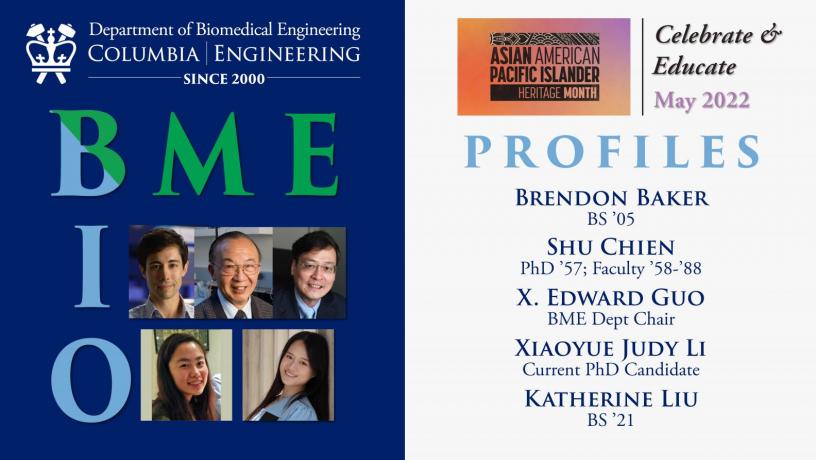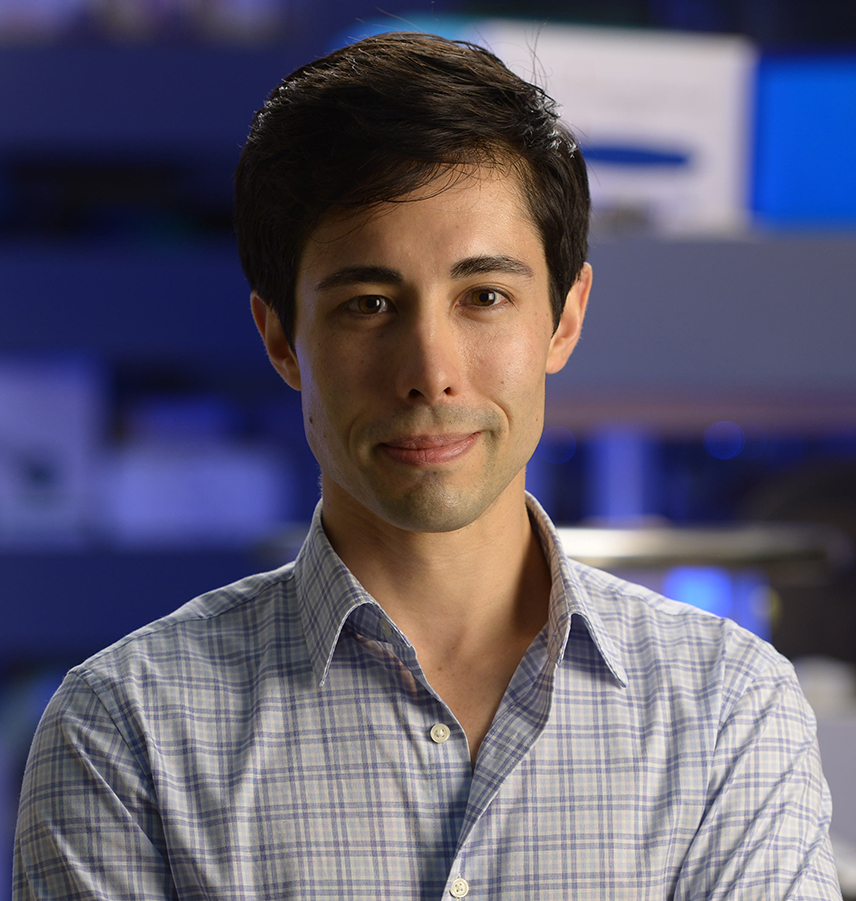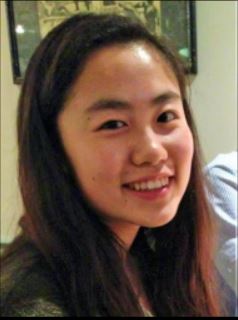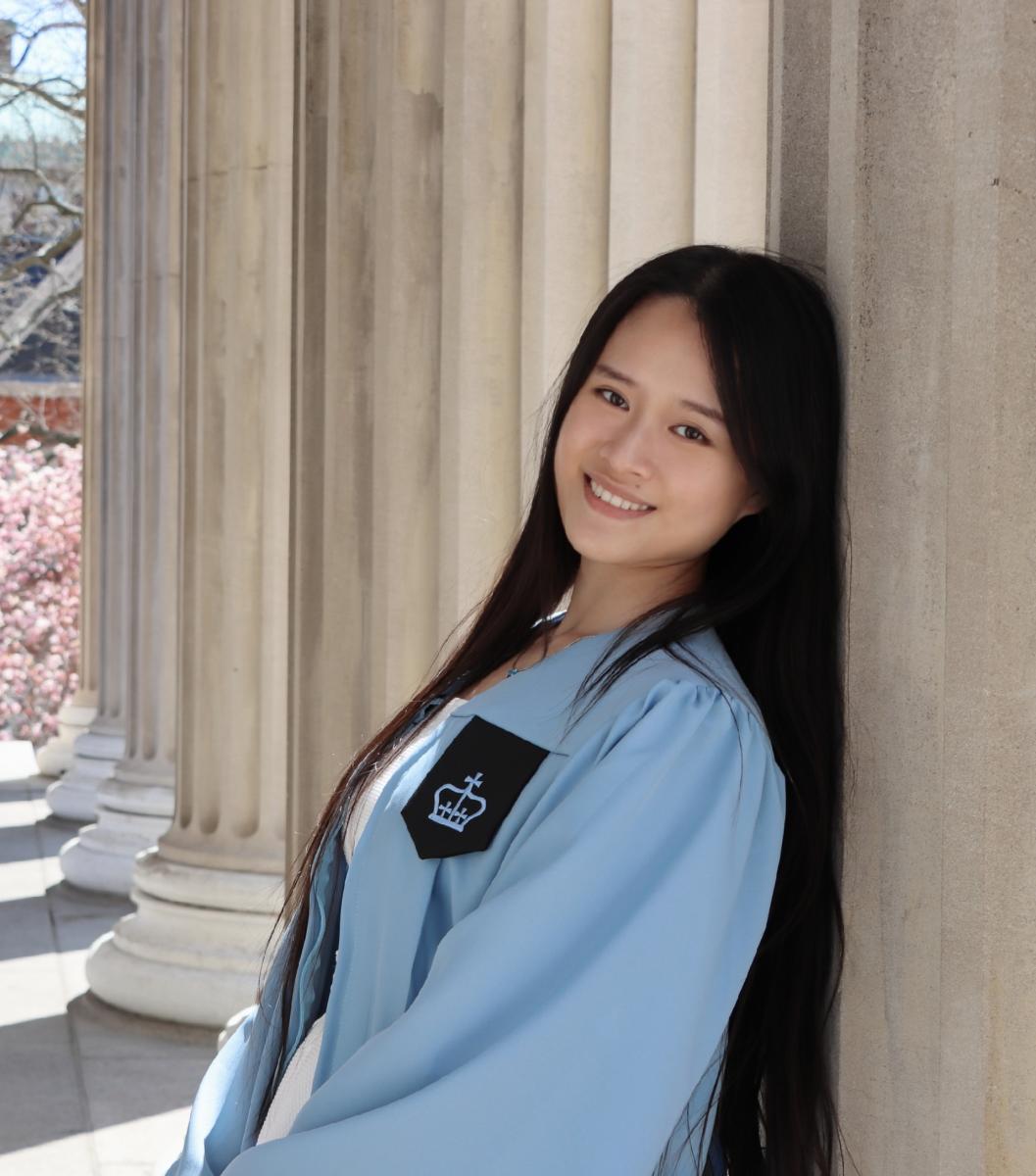BME BIO: Brendon Baker, Shu Chien, X. Edward Guo, Xiaoyue Judy Li, Katherine Liu
In honor of Asian-American and Pacific Islander Heritage Month, get to know our exceptional BME faculty, students, and alumni. Read their stories and watch video interviews below!
Diversity, Equity & Inclusion

BRENDON BAKER (BS ’05)

Brendon Baker
Education
- BS in Biomedical Engineering, Columbia University - 2005
- PhD in Bioengineering, University of Pennsylvania - 2010
Noteworthy Achievements
- NSF GRFP awardee
- F32 awardee
- R00/K99 awardee
Where are you from?
Bedford, MA
What is your current position?
Assistant Professor of Biomedical Engineering, University of Michigan
The Baker Lab studies how the structure and mechanics of the tissue microenvironment influence fundamental biological processes including cell migration, proliferation, and matrix synthesis. To do so, we develop tunable biomaterials that mimic the 3D and fibrous nature of native ECMs, can be dynamically remodeled by cells, and have the potential to be scaled to implantable tissues directly. Combined with molecular tools, stem cell technologies, live imaging, and microfabrication/microfluidic approaches, these materials help us to understand the physical interactions between cells and their surroundings. We apply mechanistic insights from these studies to improve the treatment of ECM-mediated diseases such as fibrosis and cancer and to engineer tissues for organ replacement therapies.
How did you become interested in STEM research and, more specifically, in biomedical engineering?
I was always enamored with biology, but my mother is an Asian software engineer, and as such is quite pragmatic. She was adamant that engineers of any sort were more employable in the long-run. Weighing options between a biology program elsewhere and biomedical engineering at Columbia, I eventually chose the latter. Eventual employability was certainly alluring, but so was the Big Apple!
Tell us about your family. Who has/have been your strongest influence(s) in life?
I think the strongest force for achieving more has come from my peers and not my family. Family members are typically shifted from you generationally and thus incomparable. Peers in school, members of your cohort in whichever program, etc. are under the same or at least similar pressures as you. My pursuit of a career in academia stems entirely from the goals of my compatriots in grad school - if they had these aspirations, why couldn't I?
Tell us about your experience as an AAPI academic professional in STEM.
I don't strongly identify with AAPI or caucasian Americans; being biracial, I've always felt on the fringe of racial groups. I've weighted my identity more heavily towards who I associate with and what I or others can achieve scientifically, and less so on cultural or racial identity.
What does AAPI Heritage Month mean to you?
Not much, to be quite honest. I think it's great to acknowledge different heritages and celebrate the diversity of people united under the grand goal of moving science forward, but ultimately my appreciation for scientists is not predicated on the specifics of their identity or history, but their contributions to science.
What accomplishment(s) are you most proud of, and what do you hope to accomplish in the future?
I invest a lot of my time in the research and career success of my graduate students, and so recently winning a mentor award meant a lot to me. I know that my highest likelihood of long-term impact is to train people who will go out into the world and do greater things than I ever could.
What advice would you give to others who wish to pursue a degree and/or career in BME?
I view good BME's as integrators: people who can move science forward by bridging across disciplines. For what they lack in depth, they compensate by breadth and the resulting ability to span medicine, biology, and engineering. As science becomes more and more interdisciplinary, I think the ability to speak multiple scientific languages and unite seemingly disparate efforts under one objective is incredibly useful.
XIAOYUE JUDY LI (PhD Candidate)

Xiaoyue Judy Li
Education
- Bachelor of Engineering, Vanderbilt University, 2014-2018
- PhD, Biomedical Engineering, Columbia University, Exp. 2023
Noteworthy Achievements
- NSF GRFP awardee
Where are you from?
I was born in China, but I grew up in Utah and Illinois!
What is your current position?
PhD student
How did you become interested in STEM research and, more specifically, in biomedical engineering?
Both of my parents are engineers, so I had a lot of early exposure to the field. I have a lot of memories as a child playing in my parents' offices after school, and both of my parents were always happy to tell me about their work. I grew up thinking that STEM was a fun, fascinating field to work in. I specifically became interested in biomedical engineering in high school, when I started taking biology classes and learning a bit about medicine. I thought that biomedical engineering would be a great mix of my interests in biology/physiology and engineering.
Tell us about your family. Who has/have been your strongest influence(s) in life?
My parents are the biggest influences in my life. Like many other immigrant families, my parents came to America to provide a better life for their kids. They are the hardest working people I know, and are always grateful for all the opportunities they have been able to have.
What does AAPI Heritage Month mean to you?
I grew up in small towns in Utah and southern Illinois, with low AAPI populations. Growing up without any other cultural references, I always felt the need to assimilate into mainstream "American" culture. I feel that I am just learning now about the myriad cultures that make up America, and about my own unique perspective as an Asian American. AAPI Heritage Month showcases and represents our culture, and highlights issues within and directed towards our community. I feel that this is very important for a group that is so often ignored or sidelined in America.
KATHERINE LIU (BS ’21)

Katherine Liu
Education
- BS in Biomedical Engineering, Columbia University - 2021
Noteworthy Achievements
- 2021 Distinguished Student Leadership Award by Columbia Engineering Alumni Association (CEAA)
- 2021 Columbia Biomedical Engineering Top Senior Design Team Member
Where are you from?
Shanghai, China
How did you become interested in STEM research and, more specifically, in biomedical engineering?
I fell in love with biology and engineering design when I was a high school student and decided to pursue both through Columbia's biomedical engineering program. During my years at Columbia, I was inspired by the tremendous potential of biomedical innovations and their versatile application, translationally or clinically, to improve human lives.
What does AAPI Heritage Month mean to you?
It means recognition that the Asian-American community is a diverse group of individuals with different backgrounds and talents, not the target for unjust treatment and attribution fueled by negative emotions or irrational thoughts. We are, just like any other human being in the world, unique in our own ways and not defined only by our geographical or ethnic origins.
What accomplishment(s) are you most proud of, and what do you hope to accomplish in the future?
I am most proud of my four years serving on the Engineering Student Council (ESC) at Columbia, first as the International Students Representative and as the VP of Student Life in my senior year. It was a great honor to contribute to the SEAS community and foster our sense of community, and I enjoyed every moment planning and hosting events in the interest of my fellow schoolmates. Outside of school, I co-founded the Ivy League Council for International Student Affairs (Ivy CISA), an NPO that focuses on building a network of undergraduate international students in the United States. We held several conferences in the past where international student leaders from the other Ivy institutions traveled to Columbia for a day of discussion over issues such as international alumni network, visa policies, and global career opportunities.
BME Alumnus / Former Faculty Shu Chien, PhD & PhD Candidate Naveed Tavakol - AAPIHM BME BIO Interview
BME Department Chair X. Edward Guo, PhD & PhD Candidate Divya Bhansali - AAPIHM BME BIO Interview
